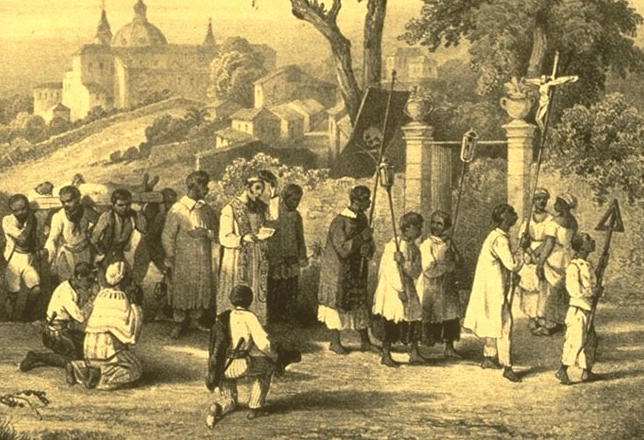Faculty Research
-
 Hugh Cagle - Fault Lines: Epidemic Disease and the Contest for Medical Expertise in
Portuguese America, 1550-1700
Hugh Cagle - Fault Lines: Epidemic Disease and the Contest for Medical Expertise in
Portuguese America, 1550-1700
This project draws on three weeks of archival research in Rio de Janeiro at the Biblioteca Nacional, the Arquivo Nacional, and the Fundação Oswaldo. My focus is a collection of rare books and manuscripts pertaining to the role of women—African and Amerindian, slave and free—in struggles for authority over the definition and treatment of illness in the colonies. This material helps me link what are perhaps the most heavily-researched aspects of colonial Brazilian history—the religious, racial, and gender configurations that resulted from widespread missionary activity and a pervasive reliance on African slavery—to the history of science and medicine. And that, in turn, allows me to demonstrate the contribution of African slaves, women, and Brazil’s indigenous peoples to both colonial medical practice and to the making of early modern science.
The research pursues two lines of inquiry. The first is an examination of an unpublished medical treatise penned by the Coimbra-trained, Portuguese physician Simão Pinheiro Morão in the 1680s. By that time, women of African descent had become the medical specialists of first resort for most members of the colony. Morão was the chief protagonist in a controversy over the clinical primacy of these healers and wrote two acerbic denunciations of them.
The second line of research will focus on pharmacopoeia housed in the Biblioteca Nacional. These were the products of sixteenth and seventeenth century Jesuit bioprospecting; missionary aldeias served as laboratories of medical and botanical investigation. Compilations of local materia medica allowed the Jesuits to wield Amerindian medical insight as if it were their own. Evidence from Lisbon suggests that, before the late-seventeenth century, Jesuit missionaries—the chief arbiters of cross-cultural interaction and medical exchange between the Portuguese and Brazil’s native peoples—were also the only group of medical specialists who competed with African descended healers. And they did so not with European medicines but with plants native to Brazil.
-
 Bradley Parker - Spanish Colonial Deportation and Daily Praxis in the Zaña Valley
(Peru)
Bradley Parker - Spanish Colonial Deportation and Daily Praxis in the Zaña Valley
(Peru)
In the summer of 2014, Bradley Parker will begin a new archaeological research project on the north coast of Peru. This project will assess the impacts of the Spanish colonial reducción movement on the indigenous populations of the Zaña valley. To do so Bradley will apply methodologies in microarchaeology developed at the University of Utah to households at two sites: one indigenous village that existed in the era before the reducción and another that was created as part of the Spanish colonial reducción movement.
The overall goal will be to research how, or if, the daily life of the indigenous inhabitants of these sites changed as a result of colonial intervention. Field research will focus on the extraction of soil samples from the matrices of earthen floors in domestic structures at these two sites. Samples will then be exported to the University of Utah for analysis. Laboratory processing will aim to identify and quantify the various categories of material debris including different types of chipped stone, ceramics, bone and other microartifacts (such as ground stone, copper, beads etc.). The resulting microartifacts will be counted, weighed and compared with control samples taken from surrounding soils. Bradley will be aided in the processing of these samples in the Microarchaeology Laboratory (CTIHB 213) by LAS students who he hopes to fund through the UROP program. Laboratory analysis will focus on the spatial analysis of artifact distributions.
Robust comparison of these data will address how the grand imperial aims of the reducción movement were articulated and contested within quotidian spaces and provide a valuable case study for examining the relationship between imperial urban design and daily praxis.
-
 Cecilia Wainryb and Alicia Barreiro - The Development of Identity and Morality in
a Historical Context of Extermination, Political Exclusion, and Discrimination: The
Mapuche in Argentina
Cecilia Wainryb and Alicia Barreiro - The Development of Identity and Morality in
a Historical Context of Extermination, Political Exclusion, and Discrimination: The
Mapuche in Argentina
The Mapuche are a group of indigenous inhabitants of southwestern Argentina. Although the Argentine government waged a systematic war against them (and other indigenous groups) in the late 19th century, with thousands being exterminated or sold to wealthy landowners, in the last two decades an organized Mapuche community emerged in Trenque Lauquen (445 km from Argentina’s capital city), pledging rights to self-determination and making political demands for both cultural recognition and lands.
Interestingly, this movement has created not only conflicts with the Argentine government but also internal conflicts among different groups of descendants, some of whom claim not to identify with a distinctive indigenous identity but rather favor a national allegiance. Our aim is to investigate the processes of identity formation and moral development among Mapuches youth, as these processes get played out in the midst of such conflict-ridden sociopolitical realities. Specifically, we ask how Mapuche youth develop a sense of their own individual identity and their group identity, as well as moral concepts bearing on justice, welfare, and rights, in the midst of historical and ongoing processes of discrimination and social and political exclusion.
